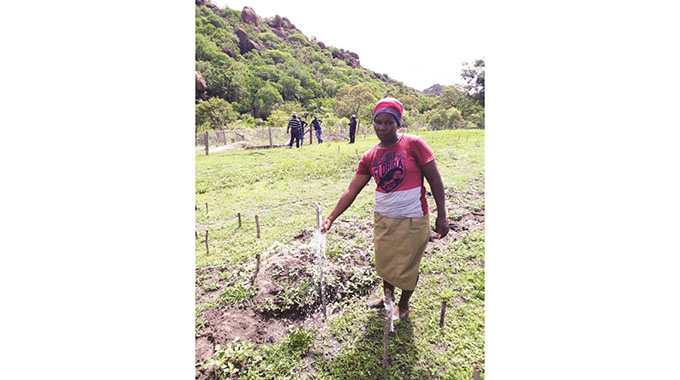
From Sifelani Tsiko in Matobo District
For Sikhanyisiwe Tshuma (41) of Lushumbe Village in the drought-prone Matobo District in southern Zimbabwe, water has been scarce for decades.
She has for several years relied on Njenani River where villagers dug out wells commonly known as umthombo in Ndebele or mufuku in Shona.
“We just had to go to the river with containers and dig shallow wells in the sand,” she said.
“Once we reached the water level, we had to wait for some time for unwanted particles in the water to settle down before fetching our water.
“Our parents survived on this for decades, but now pollution of rivers, massive siltation, the cutting down of trees and harsh droughts have all made access to water even harder. Water sources have dried up and we could walk for several kilometres to get water.”
Tshuma and most other women wasted a lot of productive time searching for water, at times walking up to 10km. The cleanliness and safety of the precious liquid was a cause for concern.
Unprotected water sources posed a health threat to her community.
For more than four decades, no non-governmental organisation had taken up the task of providing clean water for domestic consumption and gardening. And when drought struck, the situation was deplorable — animals and humans would share water from unprotected wells. The local district council, whose role is to provide and lead development in the area, had no budget to repair old boreholes or to drill new ones.
“Life was unbearable and accessing water and food was a nightmare,” Tshuma said.
Lines of worry on her face have since disappeared after Fambidzanayi Permaculture Centre and Practical Action started implementing the Renewable Energy Empowering Women Farmers (REEWF) project that has helped in the establishment of 18 solar systems to power irrigation in selected gardens.
The US$1,3 million project being funded by the Isle of Man government has supported the setting up of solar power systems in gardens dotted around Gwanda and Matobo districts that seek to empower women.
Fambidzanayi Permaculture Centre programme officer Edwin Mazhawidza said the project seeks to facilitate access to affordable, reliable and renewable energy for powering agriculture production through solar.
“This project aims to empower women farmers through improved access to clean renewable energy that supports water production for irrigation and garden plots for smallholder farmers,” he said.
“We have trained the farmers on crop husbandry, water harvesting, agro-ecology, market linkages, management of natural resources and also business and leadership skills.”
With water now gushing out of taps, Tshuma is ecstatic. She cannot believe that she can now access clean and potable water both for consumption and gardening.
“I’m very happy about this project. It has given us hope to live. We can now grow our own food crops and earn income to look after our families,” she said.
“Even our husbands are now supporting us and seeing the light. Their arts and craft businesses which used to bring some money home have all collapsed following the reduced number of tourists coming to Matopo National Park.”
Tshuma and other farmers at Thuthukani Garden Project are upbeat and now looking forward to growing cabbages, onions, butternuts, potatoes and tomatoes for the first time in their lives.
“All these years, we have relied on buying vegetables from vendors in Bulawayo, 70km away or from our relatives coming from South Africa and Botswana,” said Sitheni Moyo, chairperson of the group.
“With water and our fenced gardens, we are now ready to plant our first crops ever. It’s a new era for us and we are so grateful to the support we are getting from Fambidzanayi and Practical Action.”
The group has 31 members, with each member having a small plot with access to water and irrigation pipes. Zimbabwe has been hit by back-to-back droughts and improving access to borehole and sand abstraction water is seen as one major way of responding to the crisis and the growing threat to climate change.
